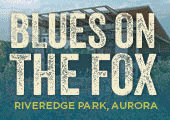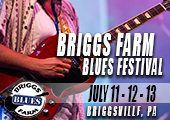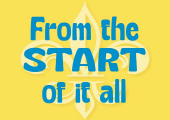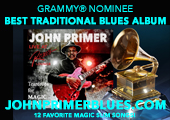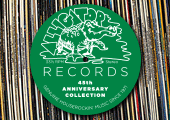CEDRIC BURNSIDE 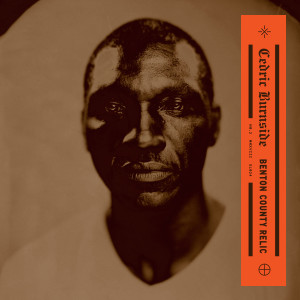
Benton County Relic
Single Lock Records – SL024
As the grandson of famed bluesman R.L. Burnside, multi-instrumentalist Cedric Burnside has quite a legacy to live up to. But as a four-time Living Blues Awards and Blues Music Awards Drummer of the Year, he is his own man. His 2015 album, Descendants of Hill Country, earned him a Grammy nomination. But all along he has acknowledged his roots: Burnside paid fitting tribute to his famous forbear with the autobiographical R.L. Burnside on 2008’s 2 Man Wrecking Crew, a guitar-and-drums collaboration with Lightnin’ Malcolm.
That instrumental setup has found itself played out by far too many rock and blues rock duos, but with Benton County Relic, the young Burnside demonstrates there’s plenty of life left in the format. Working with fellow drummer-guitarist-vocalist Brian Jay, and recording both in Brooklyn and at Memphis’ famed Ardent Studios, the pair makes a finely textured, stomping record. We Made It opens the 12-song collection in style, and the unalloyed, crunching vibe continues apace all the way to the album’s conclusion.
The songs demonstrate a healthy variety in arrangement, subject matter and vibe. Get Your Groove On delivers on its title. Typical Day feels like a Muddy Waters–style blues classic and the languid Hard to Stay Cool oozes menace and mystery as it spins out Burnside’s statement of purpose. Elsewhere, more familiar sentiments like Don’t Leave Me Girl are delivered in an arrangement that seems to suggest additional instruments that aren’t there; working together in an audio vérité production style, Burnside and Jay somehow sound like a larger ensemble.
The album’s songs are divided into two sets—like an old vinyl LP—and each set is identified with a symbol; one is a stylized sun or star, the other likely a moon. From that we can infer that the songs are thematically grouped according to subject matter or feel; it’s true that the second set (containing cuts like Death Bell Blues and I’m Hurtin’) is a bit darker in tone than the first, but setting the player on shuffle won’t lessen the impact of this collection of original material one bit.
—Bill Kopp
TRUDY LYNN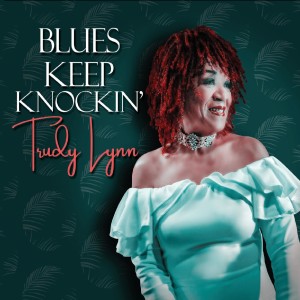
Blues Keep Knockin’
Connor Ray Music – CRM-1803
From the very first swampy note of Trudy Lynn’s Blues Keep Knockin’, one is transported back to a time when female blues belters served notice to all of the guitar-slinging, bad habit–pursuing bluesmen that women can be just as bold, rowdy and ribald as their male counterparts.
From Big Mama Thornton and Big Maybelle in the 1940s and ’50s to Etta James, who topped the charts in ’50s and ’60s, women carved their own niche in the genre dominated by men. Given that proud lineage, it’s no wonder that this Houston singer would also traverse her own unique blues pathway. But despite the fact that she’s been performing in clubs since she was a teenager, made her first studio recordings in the early ’70s and spent several years singing in Houston blues guitarist Clarence Green’s band, Lynn may be one of the best kept secrets in music.
On Blues Keep Knockin’, Lynn’s 13th solo album and follow up to 2016’s excellent I’ll Sing the Blues for You, she puts her husky, yet nuanced voice on full display on the disc’s ten songs. Paired with a solid backing outfit that includes frequent collaborator and Houston harp maestro Steve Krase, Lynn traffics in the tried and true territory of good women loving bad men, struggling to make ends meet and getting what they want when they want it, and she does it all with the conviction of a singer who truly loves the blues.
Krase’s harp kicks off the album on the upbeat shuffle of Blues Ain’t Nothin’, a tune propelled by sizzling guitar by guest Bob Lanza, who returns with some smoldering licks on the slow burn Pitiful.
Lynn delves into her personal relationship with the blues on the title track—which she wrote—an up-tempo shuffle driven by her husky rasp and tasty guitar fills by David Carter. “C’mon in Mr. Blues, sit down, have a seat / I’m just sittin’ here drinkin’ / Have a drink on me.”
Lynn switches deftly from playful to naughty to defiant on the Big Maybelle gem One Monkey Don’t Stop No Show. She gives Hoyt Axton’s Never Been to Spain her own stamp via a slow, funky groove that puts a unique spin on the ’70s classic made famous by Three Dog Night. You can practically hear the pool balls smacking and smell the backroom smoke on When I Been Drinkin’, a down and dirty dose of swampy New Orleans swagger.
Lynn is joined by Houston guitarist/vocalist Carolyn Wonderland on the closer, Wouldn’t It Make Any Difference to You, with Wonderland offering some righteous fretwork on the mournful track.
Blues Keep Knockin’ is proof positive that it may have taken a few years, but Lynn appears to be an artist who’s just hitting her stride.
—Rod Evans
FRANK BEY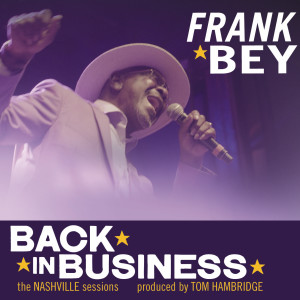
Back in Business
Nola Blue – NB-006
Vocalist Frank Bey’s career extends back to the glory days of deep soul—he toured with Otis Redding in the 1960s—but he had to wait until 1998 (some sources suggest 1996) to record his first album, Steppin’ Out, on his own MAG label. He’s had a few more releases since then, and he’s also maintained an active performing schedule, primarily around the Philadelphia / New Jersey area. His Soul for Your Blues CD (Blue Dot) garnered a nomination for Soul Blues Album of the Year at the 2014 Blues Music Awards.
Although he’s not credited as songwriter—six of the 11 outings here were written or co-written by producer/drummer Tom Hambridge; the set also includes a remake of Mighty Sam McClain’s Where You Been So Long—Bey inhabits these songs as if he’d lived them. Backed by a swaggering, horn-rich studio aggregation equally at home with 12-bar blues and soulful funk (albeit often marred by a rock-like lack of subtlety, especially in Rob McNelly’s guitar solos), his voice is supple yet toughened with a streetsy coarseness. He shines especially on ballads: The Half of It, penned by Hambridge and Richard Fleming, eloquently evokes the country/soul fusion that characterized so much of the classic-era Memphis / Muscle Shoals sound (it could almost pass for a cover of a long-lost James Carr side), and Bey—no doubt summoning influences dating back to his years performing alongside Redding—masterfully immerses himself in that indelible mix of romanticism, angst and soul-cleansing power. Conversely, he deftly summons the complex mix of pathos, regret and philosophical resignation in the ironically lilting pop ballad Ain’t No Reason, and on more conventional soul and soul blues outings he sounds fearless in his dedication to celebrating the joys of both Saturday night and Sunday morning.
No new territory is blazed here—but then, one of the joys of this music is the way a dedicated practitioner can make the familiar sound new again, and Frank Bey shows himself to be exactly that kind of artist.
—David Whiteis
MARIA MULDAUR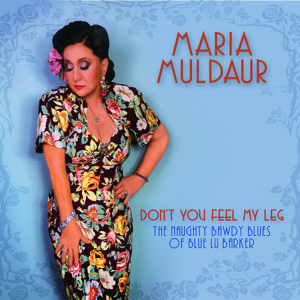
Don’t You Feel My Leg: The Naughty Bawdy Blues of Blue Lu Barker
The Last Music Company – LMCD210
When Maria Muldaur was recording her first solo album in 1973, pianist Mac “Dr. John” Rebennack brought her the song Don’t You Feel My Leg. Written by his fellow New Orleanians, the husband and wife team of banjoist/guitarist Danny Barker and singer Louisa “Blue Lu” Barker, it was a hit record for Blue Lu on the Vocalion label in 1938. Muldaur immediately embraced the risqué blues number; it became one of the most popular tracks on Maria Muldaur and remains in her repertoire until this day. The success of the LP brought the Barkers substantial royalty checks, and Muldaur became friends with the couple. In 2016, Muldaur was invited to perform a tribute to Blue Lu at the annual Danny Barker Banjo and Guitar Festival, so she put together a set of songs associated with Blue Lu and a band of top-flight New Orleans musicians. Don’t You Feel My Leg: The Naughty Bawdy Blues of Blue Lu Barker was inspired by the success of that performance.
Muldaur reassembled a rocking band for the recording sessions in New Orleans, and they epitomize the way musicians in that city can create a sound that is simultaneously part jazz, part blues and part R&B. The rhythm section of Herlin Riley on drums, David Torkanowsky on piano, Roland Guerin on bass and Chris Adkins on guitar lay down a spirited underpinning for the familiar, smoky burr of Muldaur’s vocals. It’s particularly fitting to have Riley on the session not only for his groove master abilities but because he was a protégé of Danny Barker and knew the couple well. The cast of six horn men—two each on trumpet, clarinet/saxophone and trombone—in various combinations paint the proceedings with a deep blue feeling and generate a rollicking energy that often features that trademark polyphony the city’s horn players create.
Back in 1973, Muldaur found the perfect balance between an alluring sensuality and playful humor on Blue Lu’s number, and that is certainly the case once again on these 12 selections. The lyrics may be naughty and bawdy, but they’re never nasty or offensive because Muldaur knows how to deliver them with a wry cleverness. The program is captivating from start to finish. On Leave My Man Alone, Muldaur’s coy delivery is enhanced by Riley’s stick work peppering the groove, Torkanowsky in full New Orleans piano-professor mode and saxophonist Roderick Paulin’s fiery solo. Trumpeter Kevin Louis’ opening trumpet line sets a blues-drenched mood for Muldaur’s slow and sultry take on Loan Me Your Husband. All six horns join in as Muldaur leads the band through the raucous boogie Now You’re Down in the Alley. Muldaur shows that she can swing brightly as she engages in a call and response with the band on A Little Bird Told Me. With Trombone Man Blues, Muldaur really shines as she stretches her lines to emulate the sound of a trombone and works Danny Barker’s double-entendre lyrics for maximum effect: “He could push it back in forth / He could slide it side to side / But when he changed to tuba / Ooh—I had to grab my things and hide,” setting up trombonist Charlie Halloran for an extended solo. Don’t You Feel My Leg: The Naughty Bawdy Blues of Blue Lu Barker pays tribute to a great New Orleans blues singer and testifies to the vitality and mastery of Maria Muldaur as she continues to mine rich veins of American roots music.
—Robert H. Cataliotti
JOHNNY RAWLS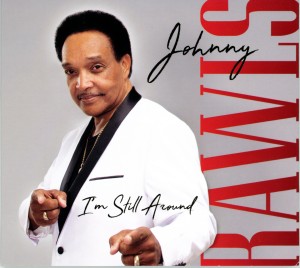
I’m Still Around
Third Street Cigar Records – TSC 105
We can be very glad that Johnny Rawls is still around. His smooth, soothing, sensuous vocals define the phrase “sweet soul music” and he remains the best soul blues singer today. Mississippi-born Rawls has received at least 16 Blues Music Award nominations; Rawls’ newest CD is one of the best of the year, so it should certainly win him a few more nominations. He’s joined on the album by an able band of musicians, including Larry Gold on guitar, Johnny Newmark on bass, Cadillac Dan Magers on keyboards, Scott Kretzer on drums, Ric Wolkins on trumpet, Mark Lemle on saxophone and John McGhee on guitar.
The album kicks off with the groovin’ vibe, bright guitars and wailing horns of Running Back to You; the song would fit right in on any collection of Carolina beach music, and if you’re not shagging in your chair as you listen to this song, then you need to check your pulse. If there’s ever been a perfect blend of guitar, horns, vocals and background vocals, this is it. What You Do to Me scampers along Newmark’s bass line, propelled by Rawls’ vocals and the horns of Wolkins and Lemle. Rawls tenderly touches his lover’s heart on the powerfully heart-rending love letter, Darling I Love You. It’s slow-burning soul blues in the tradition of Bobby “Blue” Bland’s Members Only or Jerry Butler’s A Brand New Me. One of the most gorgeous songs on the album is the up-tempo Back It Up on Me, on which Rawls’ vocals float on the ethereal voices of his background singers and on Lemle’s sax. On the title track Rawls tells his story of life in music; he reminds us that he’s been up and he’s been down, but he wants the world to know that he’s still around. The album closes with Rawls’ own take of a familiar old gospel tune, God Been Good to Me. In Rawls’ hands, it’s a bright, moving-on-down-the-road spiritual that offers praise and thanks for making it through every day and making it this far in life.
There’s not a bad song on I’m Still Around, and the best songs display Rawls’ ability to get inside a song and deliver with honesty, emotion and soul, and to create a beautiful moment that touches us or gets us moving. Thank goodness he’s still around and sharing his gift with us on albums like this one.
—Henry L. Carrigan Jr.
TONY JOE WHITE
Bad Mouthin’
Yep Roc – YEP-2593
Born into a music-loving family, Tony Joe White grew up listening to his parents and siblings play and sing on their front porch. It wasn’t until his older brother brought a Lightnin’ Hopkins album home, however, that the Louisiana native was inspired to pick up the guitar himself. Though not known as a blues artist per se, the influence of the blues has nevertheless filtered through his evocative slice-of-life songs and playing style over the years. On his latest release, Bad Mouthin’, he focuses strictly on the blues, recording five blues-based originals and six covers of songs by or associated with Hopkins, Jimmy Reed, Charley Patton and others.
Recorded in a barn on White’s Tennessee farm and produced by his son Jody, the album has a relaxed, intimate atmosphere and a warm sound. Most tracks feature just White and his guitar, with shots of harmonica peppered throughout and occasional backing from drummer Bryan Owings—who often tours with White—and bassist Steve Forrest. These elements combined capture the spirit of White’s recent live performances.
Two of White’s songs are among his earliest compositions. The driving title track thrums with drained discontent, and the forlorn Sundown Blues rolls along with a shuffling, Reed-esque rhythm. His bass-baritone voice is subtly expressive, conjuring a lover’s caress on Cool Town Woman or a low rumble of thunder on Big Boss Man. He opens Hopkins’ Awful Dreams with Bad Dreams, a brief, moody instrumental, then plays and sings his idol’s song with spare, crawling licks and deep despair. John Lee Hooker’s Boom Boom is juiced up with a sexy, rocking beat. Elvis Presley was one of many artists to cover White’s songs—most famously Polk Salad Annie—and here White returns the favor by giving Heartbreak Hotel a lowdown, muted spin.
In a sense, this is the album that Tony Joe White has always been destined to make. A bone-deep cut of blues at its most elemental, Bad Mouthin’ brings White’s music and his inspirations full circle.
—Melanie Young
ERIC LINDELL
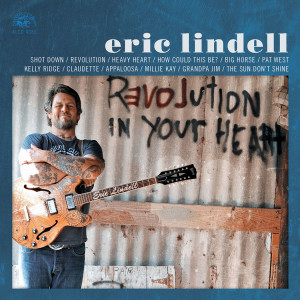
Revolution in Your Heart
Alligator Records – ALCD 4985
The soulful title track of Lindell’s new album illustrates his powerful ability to grab us from the song’s first note and to keep driving us deeper and deeper into the sounds he builds layer upon layer. Like Dylan’s Like a Rolling Stone, Lindell’s Revolution kicks off with a snare shot, but Lindell then builds the song out from his crunchy guitar chords; at under three minutes, the song joyously launches, catches and carries us along, and accomplishes its thematic journey with bright encouragement to look inside yourself.
The rest of Revolution in Your Heart follows the lead of the title track. While most of the tracks are under three minutes, they pack a musical punch, and most of them keep us moving with their propulsive rhythms, many reminiscent of a New Orleans street parade. California native Lindell plays almost all the instruments on the album, but Kevin McKendree joins him on piano on Millie Kay, and Willie McMains provides drums and percussion.
The funked-up, wah-wah drenched Big Horse combines some of the pedal magic of Hendrix with the country rock of the Burritos and Byrds in a song whose roaming sound mirrors the restless quest chronicled in the lyrics. Pat West shimmers with bright guitar chords and sounds, while Kelly Ridge gallops along to a driving snare; it’s an up-tempo, country-flavored song that sounds a little like what would happen if Stephen Stills met the Surfaris who then met up with Pure Prairie League and wrote a song. Lindell is a crisp guitarist who knows just when to bend the strings to take a song in an unexpected direction. Appaloosa is a funky rocker that mirrors the rhythm of a horse trotting down a road, while Millie Kay is a full-blown country ballad. The Sun Don’t Shine has echoes of the Gentrys’ Keep on Dancin’, if that driving pop song were written by Chuck Berry, Delbert McClinton and Kris Kristofferson. The Sun Don’t Shine showcases Lindell as a songwriter, guitarist and singer.
Revolution in Your Heart celebrates life, love and joy, and there’s no way you can sit still while Lindell’s album is playing. His driving guitars wash over you, his lively and affectionate lyrics grab you, and every song moves your feet and your heart.
—Henry L. Carrigan Jr.
MS. JODY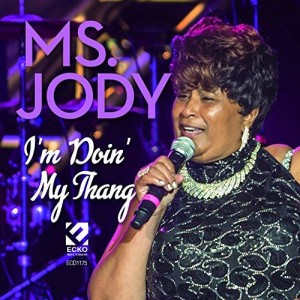
I’m Doin’ My Thang
Ecko – ECD – 1175
Ms. Jody’s “thang” is lusty celebration, flirtatious and enticing, with just enough serious-minded meditation on the vicissitudes of life and love to keep herself from becoming a novelty act. By now she’s honed her act so sharply that it’s almost redundant to describe it—she’s virtually an eponymous genre unto herself.
The title tune here is structured closely around Marvin Sease’s I’m Mr. Jody—both a key to this album’s strengths and a potential warning sign. Grafting new lyrics onto a familiar melodic and rhythmic framework is a well-known conceit, and Jody pulls it off with aplomb—she sounds as sassy and irrepressible as ever, and we’re delighted to dance (and booty-shake) right along with her. But following that song with Curiosity Ain’t Gonna Kill This Cat, a virtual remake of her earlier Your Dog’s About to Kill My Cat (albeit with a newly assertive, and welcome, lyric message), makes one wonder whether someone at Ecko is either resting on laurels or running out of ideas.
Fortunately, a lot of the other tracks here bespeak originality, at least as far as lyrics are concerned. Jody’s own Let’s Play Hide & Seek winningly fuses romanticism and eros; We’ve Got the Real Thing, another Jody original, is a ballad shot through with both ecstasy and longing (we’re never quite sure whether the singer is celebrating a love affair or fantasizing about one); it showcases Jody at her most emotionally complex and satisfying). The CD’s closer, Never Goin’ Back, is likewise notable for its complexity—riding atop a bass line evocative of Betty Wright’s Tonight Is the Night, Jody delivers her fable of romantic regret with bittersweet pathos.
At their best, the contributions from John Ward and his compatriots at Ecko—I’m a Cowgirl in the Bedroom and the bluesy We’ve Got to Cheat on Schedule—both celebrate and elaborate on Jody’s finely crafted and seemingly inexhaustible stage persona (even if an outing like A Kitty Ain’t No Match for a Full Grown Cat stretches that particular metaphor until it yowls). Nonetheless, it’s clear that Ms. Jody has the ability to expand her emotional palette and encompass more fully the kind of emotional maturity and texture exemplified here by offerings like Real Thing and Never Goin’ Back. Now that she’s an established star, both she and her Svengalis at Ecko should summon the courage to take a chance and challenge established southern soul expectations: it’s time to get serious with Ms. Jody and allow her to blossom into the full-fledged soul singer she has it in her to be.
—David Whiteis
BILLY F GIBBONS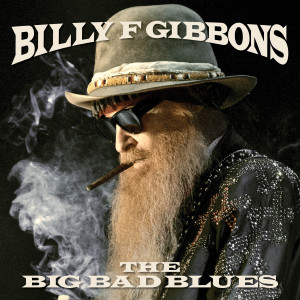
The Big Bad Blues
Concord – CRE00746
What’s there to say about a new Billy Gibbons’ album except to put it on and crank it up. Gibbons returns on his new solo album to straight-ahead funky rockin’, propelled by his and Elwood Francis’ guitars and harp, Greg Morrow’s and Matt Sorum’s drums, Joe Hardy’s bass, James Harman’s harp and Mike Flanigin’s keyboards. Gibbons’ follow up to his 2015 Perfectamundo, The Big Bad Blues delivers just what the title promises: slow blues rumbles, down-and-dirty blues rockers, playful lyrics and scalding guitar and harp work.
Second Line chugs along with rocking, Chuck Berry–like riffs; it’s a driving dance tune with fret-running lead riffs on the bridge. Gibbons kicks off the album with his characteristic growling and grunts—“yeah, yeah, yeah”—between lines on Missin’ Yo’ Kissin’, a propulsive rocker with drums that lead into the bridge, and the lead phrases on the riff echo La Grange and Sharp Dressed Man. My Baby She Rocks takes off on a slow-moaning blues rock flight that celebrates the singer’s lover rocking and shaking him all night long. Gibbons and band capture the rhythms of a night of slow and easy—and earth-moving—love making with their measured blues and cascading guitars and harp. Gibbons delivers an electrifying version of an early Muddy Waters’ song, Standing Around Crying, on which his vocals growl and moan like Waters’; the song undulates gently, capturing the anguish of waiting for a love that’s now gone. The funky That’s What She Said rockets off the record with its funky harp wails, while Mo’ Slower Blues chugs along with its slow chord progressions and deliberate rhythms. The album closes with a bright calypso pop song, Crackin’ Up, which is just plain fun.
The Big Bad Blues gives us Gibbons at his very best; he’s having fun playing this music, and the best way to listen to this record is to let the music wash over you and let Gibbons take you where he leads. You won’t be sorry.
—Henry L. Carrigan Jr.
MARTY CHRISTIAN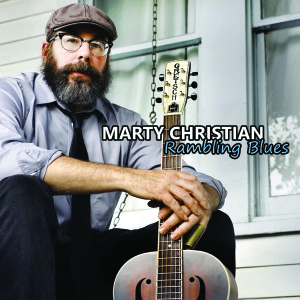
Rambling Blues
Sabidog Records – CD002
As a solo artist, bandleader and veteran of Henry Gray and Carol Fran’s bands, Marty Christian has cultivated a musical approach that spans multiple genres, including funk, country, zydeco and soul. Yet the heart of his music has always been the blues. The latest solo release from the Lafayette, Louisiana–based guitarist and singer-songwriter is truly that—on Rambling Blues, he performs six classic blues songs alongside seven of his originals, accompanying himself on guitar.
And it’s Christian’s guitar skills that are front and center here, whether the Delta-style picking on his lovely version of Ida Cox’s Rambling Blues, the frenzied, knife-like attacks on Muddy Waters’ Country Blues or the flowing-molasses licks on Sitting on Top of the World. The sound is focused and intimate throughout, and the playing at times so intense you can hear the clacking of the guitar body, such as on the lover’s plea Now Now. His take on Nobody Knows You When You’re Down and Out is surprisingly jaunty, with an almost ragtime feel. The freewheeling style and energy of his originals Carnival of You and Write Me a Letter bring to mind early Van Morrison. Three instrumentals round out the set, including the amusing, unusual morsel Russian Tea Biscuit.
Bottom line, Marty Christian makes beautiful music, and Rambling Blues is another fine showcase of his artistic gifts.
—Melanie Young







